Story
Fanny By Gaslight is written in the narrative form of alternating person. Initially set in France (in the fictional Ile de France village of Les Yvelines-la-Carriére [1] ) in the 1930s, and written in the third person, it tells of an encounter between a middle-aged book publisher, Gerald Warbeck, and an elderly lady whom he first assumes is called Mme Oupére, but discovers is English, and called Hooper. He becomes intrigued by how she ended up in a provincial French backwater, and persuades her to tell him her story.
The narrative then moves to the first person of Fanny Hooper. It begins with her describing her childhood in London during the 1860s with her mother and stepfather, who ran a tavern called "The Happy Warrior" in Panton Street, off Leicester Square. Below the tavern, her stepfather (called Hopwood) also ran a brothel, known as "Hopwood's Hades". Hopwood is eventually framed for murder by a customer, Lord Manderstoke (unquestionably the villain of the novel) and sentenced to prison, where he dies. Fanny's mother returns to her family home in Yorkshire, and places Fanny — now fourteen — in the care of family friends the Becketts, where she befriends their daughter Lucy. Fanny's mother discloses to her that her natural father is Clive Seymore, the son of a wealthy landowner in Yorkshire, and Fanny begins work in the Seymore household in London, where only she and Seymore — but not Seymore's glamorous and rather wanton wife Lady Alicia — know the truth about who she is. Lucy begins work in an apparently exclusive dress-shop (ultimately frequented by Lady Alicia) which is itself a front for a high-class brothel. Discovering Lady Alicia's faithlessness, but terrified that she suspects the truth about Fanny being Seymore's illegitimate daughter, Fanny escapes the Seymore household to another tavern, this one in Islington run by a former employee of her stepfather called Chunks. After working as a barmaid there she moves to the employ of Kitty Cairns, helping her manage a brothel near Regent's Park.
At this point the narrative moves to the first person of Harry Somerford (although we later realise this is merely a device Warbeck has decided to use in the re-telling of Fanny's story). Harry is a frequent client of Kitty Cairns, and here he meets Fanny, and they fall in love. She is reluctant to marry him immediately, partly because their relationship is complicated by Fanny's father being Harry's superior at work. Whilst out on an evening with Lucy, who is now a chorus-girl, Harry and Fanny encounter Manderstoke, who makes a pass at Lucy before Harry knocks him out cold. They contrive to get Lucy away from London and out of Manderstoke's reach.
Switching back to Fanny as narrator, the couple enjoy a holiday in France, where they stumble upon the idyllic setting of Les Yvelines. Returning to Paris, they discover Lucy, now appearing in an erotic tableau vivant. To their horror, they find she has fallen in with Manderstoke, and he and Harry agree to a duel to settle their differences. Harry is wounded, ultimately fatally, but not before Fanny reveals to him that she is carrying his child.
The narrative concludes in the third person again, with Warbeck agreeing to write Fanny's biography, but before it is published, Fanny dies. Warbeck carries out her final wish that she and Harry be memorialised in Les Yvelines. The novel ends with the words on their memorial: Il n'y a pas de silence plus docile que le silence de l'amour. Croyez-vous que j'ai soif d'une parole sublime lorsque je sens qu'une âme me regarde dans l'âme? [2]

Sense and Sensibility is the first novel by the English author Jane Austen, published in 1811. It was published anonymously; By A Lady appears on the title page where the author's name might have been. It tells the story of the Dashwood sisters, Elinor and Marianne as they come of age. They have an older half-brother, John, and a younger sister, Margaret.
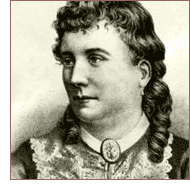
Mary Elizabeth Braddon was an English popular novelist of the Victorian era. She is best known for her 1862 sensation novel Lady Audley's Secret, which has also been dramatised and filmed several times.

Lady Audley's Secret is a sensation novel by Mary Elizabeth Braddon published on 26 May 1862. It was Braddon's most successful and well-known novel. Critic John Sutherland (1989) described the work as "the most sensationally successful of all the sensation novels". The plot centres on "accidental bigamy" which was in literary fashion in the early 1860s. The plot was summarised by literary critic Elaine Showalter (1982): "Braddon's bigamous heroine deserts her child, pushes husband number one down a well, thinks about poisoning husband number two and sets fire to a hotel in which her other male acquaintances are residing". Elements of the novel mirror themes of the real-life Constance Kent case of June 1860 which gripped the nation for years. Braddon's second 'bigamy' novel, Aurora Floyd, appeared in 1863. Braddon set the story in Ingatestone Hall, Essex, inspired by a visit there. There have been three silent film adaptations, one UK television version in 2000, and three minor stage adaptations.

Perkin Warbeck was a pretender to the English throne claiming to be Richard of Shrewsbury, Duke of York, who was the second son of Edward IV and one of the so-called "Princes in the Tower". Richard, were he alive, would have been the rightful claimant to the throne, assuming that his elder brother Edward V was dead and that he was legitimate—a point that had been previously contested by his uncle, King Richard III.

Mildred Pierce is a psychological drama by James M. Cain published by Alfred A. Knopf in 1941.

The Pursuit of Love is a novel by Nancy Mitford, first published in 1945. It is the first in a trilogy about an upper-class English family in the interwar period focusing on the romantic life of Linda Radlett, as narrated by her cousin, Fanny Logan. Although a comedy, the story has tragic overtones.
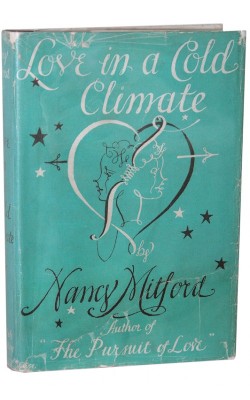
Love in a Cold Climate is a novel by Nancy Mitford, first published in 1949. The title is a phrase from George Orwell's novel Keep the Aspidistra Flying (1936).
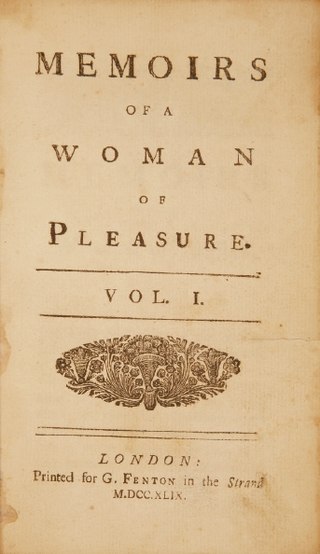
Memoirs of a Woman of Pleasure—popularly known as Fanny Hill—is an erotic novel by the English novelist John Cleland first published in London in 1748. Written while the author was in debtors' prison in London, it is considered "the first original English prose pornography, and the first pornography to use the form of the novel". It is one of the most prosecuted and banned books in history.
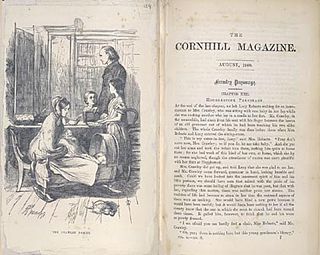
Framley Parsonage is a novel by English author Anthony Trollope. It was first published in serial form in the Cornhill Magazine in 1860, then in book form in April 1861. It is the fourth book in the Chronicles of Barsetshire series, preceded by Doctor Thorne and followed by The Small House at Allington.
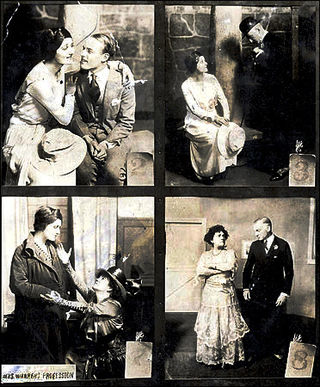
Mrs. Warren's Profession is a play written by George Bernard Shaw in 1893, and first performed in London in 1902. It is one of the three plays Shaw published as Plays Unpleasant in 1898, alongside The Philanderer and Widowers' Houses. The play is about a former prostitute, now a madam, who attempts to come to terms with her disapproving daughter. It is a problem play, offering social commentary to illustrate the idea that the act of prostitution was not caused by moral failure but by economic necessity. Elements of the play were borrowed from Shaw's 1882 novel Cashel Byron's Profession, about a man who becomes a boxer due to limited employment opportunities.

The Fortunes of Perkin Warbeck: A Romance is an 1830 historical novel by Mary Shelley about the life of Perkin Warbeck. The book takes a Yorkist point of view and proceeds from the conceit that Perkin Warbeck died in childhood and the supposed impostor was indeed Richard of Shrewsbury. Henry VII of England is repeatedly described as a "fiend" who hates Elizabeth of York, his wife and Richard's sister, and the future Henry VIII, mentioned only twice in the novel, is a vile youth who abuses dogs. Her preface establishes that records of the Tower of London, as well as the histories of Edward Hall, Raphael Holinshed, and Francis Bacon, the letters of Sir John Ramsay to Henry VII that are printed in the Appendix to John Pinkerton's History of Scotland establish this as fact. Each chapter opens with a quotation. The entire book is prefaced with a quotation in French by Georges Chastellain and Jean Molinet.
Fanny Hill is a BBC adaptation of John Cleland's controversial 1748 novel Fanny Hill, written by Andrew Davies and directed by James Hawes. This is the first television adaptation of the novel. Fanny Hill was broadcast in October 2007 on BBC Four in two episodes. Fanny Hill tells the story of a young country girl who is lured into prostitution in 18th-century London.

Fanny by Gaslight is a 1944 British drama film, directed by Anthony Asquith and produced by Gainsborough Pictures, set in the 1870s and adapted from a 1940 novel by Michael Sadleir.
Chloe Salaman is an English film and television actress.
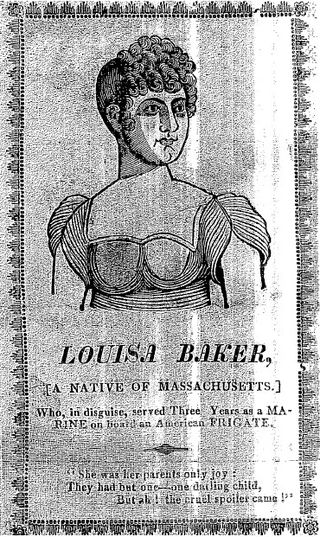
The Female Marine, or The Adventures of Lucy Brewer, was first published in 1815 as a series of pamphlets sold in Boston. The series is the supposedly autobiographical account of Lucy Brewer, although controversy has surrounded the true authorship of the story as some believe it was in fact written by Nathaniel Hill Wright.

The Lady is a 1925 American silent drama film starring Norma Talmadge and directed by Frank Borzage. Talmadge's own production company produced the film with distribution by First National Pictures.
Fanny by Gaslight is a British drama television series, which originally aired on BBC1 between 24 September and 15 October 1981. It was an adaptation of the 1940 novel Fanny by Gaslight by Michael Sadleir, which had previously been adapted into a film Fanny by Gaslight in 1944. The series was adapted by Anthony Steven, directed by Peter Jefferies and produced by Joe Waters. Chloe Salaman plays the title role of Fanny Hooper, a young woman who is orphaned and faced with hardship in Victorian London.
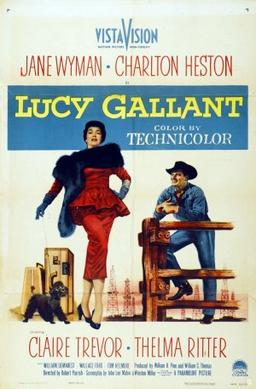
Lucy Gallant is a 1955 American drama film directed by Robert Parrish and written by John Lee Mahin and Winston Miller. The film stars Jane Wyman, Charlton Heston, Claire Trevor, Thelma Ritter, William Demarest and Wallace Ford. The film was released on October 20, 1955, by Paramount Pictures.

The Romance of a Shop is an 1888 novel by Amy Levy. The novel centers on the Lorimer sisters, who decide to open their own photography business after the death of their father leaves them in poverty. The novel examines the opportunities and difficulties of urban life for the "New Woman" in the late nineteenth century, maintaining their right to independent opinion and the questioning of social norms.

Love in a Cold Climate is a 1980 British television series produced by Thames Television. It is an adaptation of the Nancy Mitford novels The Pursuit of Love (1945) and Love in a Cold Climate (1949), set between 1924 and 1940, with a screenplay adaptation by Simon Raven. It was originally broadcast on the ITV network in eight episodes. The series starred Lucy Gutteridge, Rosalyn Landor, Michael Aldridge, Judi Dench, Vivian Pickles and Jean-Pierre Cassel.
















